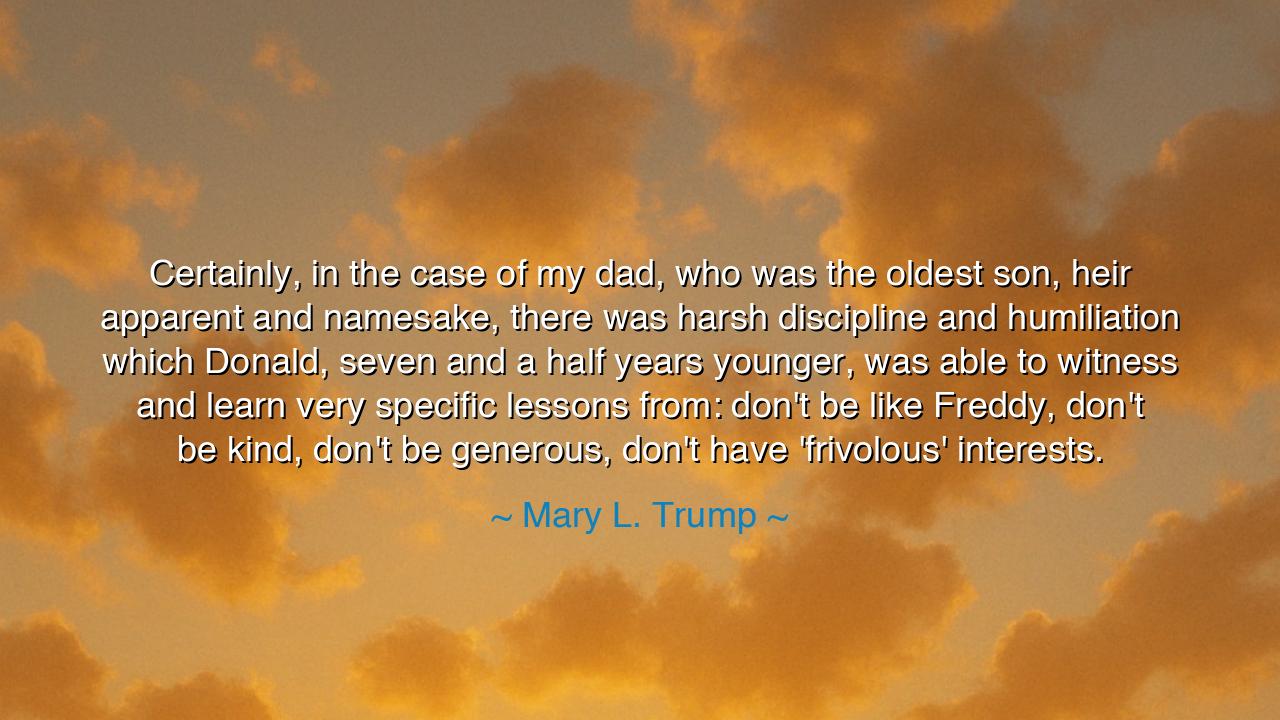
Certainly, in the case of my dad, who was the oldest son, heir
Certainly, in the case of my dad, who was the oldest son, heir apparent and namesake, there was harsh discipline and humiliation which Donald, seven and a half years younger, was able to witness and learn very specific lessons from: don't be like Freddy, don't be kind, don't be generous, don't have 'frivolous' interests.






Hearken, O seekers of understanding, to the somber reflection of Mary L. Trump, who recounts: “Certainly, in the case of my dad, who was the oldest son, heir apparent and namesake, there was harsh discipline and humiliation which Donald, seven and a half years younger, was able to witness and learn very specific lessons from: don't be like Freddy, don't be kind, don't be generous, don't have 'frivolous' interests.” In this meditation lies a profound study of inheritance, observation, and the shaping of character through example, both cruel and instructive. Here, we see how family dynamics, though often hidden, leave marks upon the soul, shaping behavior in ways both subtle and profound.
From the earliest civilizations, the elders recognized the power of modeling and example in the upbringing of children. In Sparta, young boys observed both the virtues and failings of their elders, learning discipline and courage not solely through instruction, but through witnessing consequence. Mary Trump’s words reveal a similar ancient truth: children absorb lessons from what they see as well as what they are told, and often the shadows cast by suffering or humiliation become as instructive as the light of praise.
The account also reflects the duality of inheritance through observation. Donald, the younger, was not subjected to the harshness directed at his older brother, yet he absorbed its lessons with keen awareness: which behaviors led to disfavor, which expressions of kindness were punished, which indulgences were scorned. This is an ancient pattern: in families of prominence or tension, the younger often learns by watching the fates of those who precede them. History offers countless illustrations, where siblings and heirs observed the trials of the firstborn and shaped their own course accordingly.
Consider the example of Caesar Augustus, born Gaius Octavius, who observed the struggles and triumphs of his elder relatives, learning from both their ambition and their mistakes. By observing the vulnerabilities and follies of those before him, he developed caution, strategic cunning, and the ability to navigate the treacherous paths of power. Similarly, the lesson Mary Trump conveys is that observation within family can teach both virtue and its avoidance, shaping a person’s character, often imperceptibly.
Yet there is a bitter element in her reflection: the instruction gained from harshness and humiliation often instills fear, calculation, and suppression of kindness. The older brother, Freddy, became a cautionary tale, not through guidance, but through suffering. This mirrors the ancient understanding that not all lessons are noble or intended; some are absorbed from the pain of others, imprinting caution, self-protection, or cynicism upon the observer. Here, we see how family dynamics can forge resilience or deform empathy, depending on how one interprets what is witnessed.
The insight resonates deeply in modern and historical contexts alike. Even when guidance is absent or cruel, children interpret and internalize what they observe, translating it into personal doctrine. In the annals of kings and generals, heirs often learned more from failures and punishments than from praise. The young Alexander, for instance, watched the consequences of disfavor and dissent among Macedonian nobility, shaping his ambition, decisiveness, and, at times, ruthlessness. Mary Trump’s reflection reminds us that observation is as powerful as instruction, and often more enduring.
From this meditation, a timeless lesson emerges: the environment in which one is raised, including the treatment of others, leaves indelible marks. Children are keen observers of human behavior, absorbing not only words but consequences, tone, and reaction. Therefore, be mindful of the examples you set, for they may shape character in ways both intended and unforeseen. Cultivate integrity, empathy, and fairness, lest your harshness teach lessons of cruelty rather than virtue.
Practical counsel flows naturally: reflect on your own upbringing and the lessons you have internalized, both direct and observed. Be deliberate in your actions toward others, recognizing that observation is a silent teacher. Guide through example, nurture without humiliation, and ensure that your conduct instills values rather than fear. By doing so, you transform the ancient truth Mary Trump recounts into a force for wisdom, compassion, and conscious legacy.






AAdministratorAdministrator
Welcome, honored guests. Please leave a comment, we will respond soon